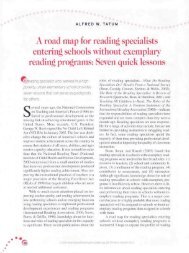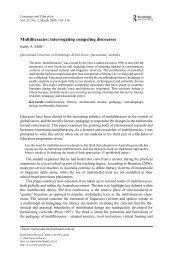final report of the marion county consolidation study ... - Oncourse
final report of the marion county consolidation study ... - Oncourse
final report of the marion county consolidation study ... - Oncourse
Create successful ePaper yourself
Turn your PDF publications into a flip-book with our unique Google optimized e-Paper software.
The second meeting: August 31, 2005<br />
Consolidation<br />
Mayor Bart Peterson discussed how <strong>the</strong> IWP originated as a means to address <strong>the</strong> city's fiscal<br />
problems but developed into a means <strong>of</strong> creating efficiencies and better service that is worth<br />
implementing irrespective <strong>of</strong> cost savings. Mayor Peterson discussed how <strong>consolidation</strong>, ra<strong>the</strong>r than<br />
administrative shuffling, is necessary to eliminate duplicative administrative structure and <strong>the</strong><br />
multiplicity <strong>of</strong> decision makers. Robert Clifford, City Controller, Director <strong>of</strong> <strong>the</strong> Office <strong>of</strong> Finance<br />
and Management, discussed how SEA 307 created current savings and efficiency by reallocating <strong>the</strong><br />
duties <strong>of</strong> <strong>the</strong> <strong>county</strong> auditor and <strong>the</strong> city controller and allowing a unified budget. He discussed future<br />
savings by reducing audit costs and having centralized purchasing policies. Mr. Clifford discussed<br />
<strong>the</strong> need for state legislation to address unfunded public safety pension liabilities. The Commission<br />
discussed <strong>the</strong> accuracy <strong>of</strong> <strong>the</strong> city's cost savings figures for reallocation <strong>of</strong> <strong>county</strong> auditor and city<br />
controller duties and <strong>the</strong> city's cost saving estimates for <strong>the</strong> IPD/MCSD <strong>consolidation</strong>. Mr. Clifford<br />
was questioned about whe<strong>the</strong>r <strong>the</strong> reallocation <strong>of</strong> duties between <strong>the</strong> controller and auditor has been<br />
implemented consistent with SEA 307.<br />
Business community response to <strong>consolidation</strong><br />
Gene Zink, Owner/CEO, Triton Pacific Investment Management, Chairman, Greater<br />
Indianapolis Chamber <strong>of</strong> Commerce, discussed <strong>the</strong> business merger process and testified that <strong>the</strong><br />
Greater Indianapolis Chamber <strong>of</strong> Commerce's <strong>study</strong> concluded that <strong>the</strong> IWP would create<br />
efficiencies and savings. Chris Pryor, Government Affairs Director, Metropolitan Indianapolis<br />
Board <strong>of</strong> Realtors, discussed how transferring township assessor functions to <strong>the</strong> <strong>county</strong> assessor<br />
would result in uniform valuations. He discussed eliminating multiple layers <strong>of</strong> government, and<br />
having a single Geographic Information System (GIS). Commission discussion followed on how <strong>the</strong><br />
city's GIS system was too inaccurate for township assessing purposes, which require an exact legal<br />
description. Tim Worthington, President/CEO, General Hotels Corporation, discussed how <strong>the</strong> IWP<br />
is a positive goal because it improves efficiency.<br />
Consolidation <strong>of</strong> <strong>the</strong> township fire departments and <strong>the</strong> IFD<br />
Jack Snook, President, Emergency Medical Services Consulting, Inc., discussed<br />
<strong>consolidation</strong> incentives for fire departments, including cost savings and greater resource control.<br />
He recommended fire-based emergency medical services (EMS) and made suggestions for<br />
proceeding with <strong>consolidation</strong>. Lori Moore, Assistant to <strong>the</strong> General President, International<br />
Association <strong>of</strong> Firefighters, discussed <strong>the</strong> advantages <strong>of</strong> including fire-based EMS in a fire<br />
department <strong>consolidation</strong>. She discussed how to determine whe<strong>the</strong>r ambulance services are cost<br />
neutral and how to design an EMS system that responds to <strong>the</strong> individual needs <strong>of</strong> <strong>the</strong> community.<br />
Mike Reeves, President, Indianapolis Pr<strong>of</strong>essional Firefighter's Union Local 416, said that <strong>the</strong><br />
transition to fire-based EMS would be cost neutral and that <strong>the</strong> union has an agreement with Mayor<br />
Peterson to pursue a fire- based EMS. The fire-based EMS system would use civilians to staff<br />
ambulances. Steve Auch, IFD Division Chief, said that patient outcome is <strong>the</strong> driving force in <strong>the</strong><br />
3
















